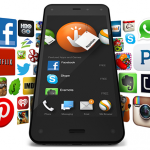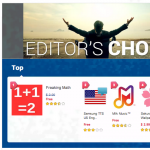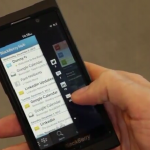Amazon's Fire phone gets more premium apps -- MapQuest and WeatherBug

Can you feel the electricity in the air? Today is Amazon Fire phone release day! Yes, the mythical smartphone, which was rumored for years, finally becomes available to consumers today. Next door to the pizzeria where I got my meatball parm hero for lunch today, is an AT&T store littered with signage for the device. There definitely is a buzz. Will it be a success? Time will tell, but a big factor will be app selection.
Yesterday, Amazon scored Microsoft OneNote for it -- a huge win for both companies. Today however, the app train keeps on rolling. MapQuest and WeatherBug, both of which are premium apps, are now available for Fire phone too. However, these are not just ports, but customized versions to take advantage of Amazon's unique hardware.
Android apps on Windows Phone: It's too complicated

No matter how you slice it, Windows Phone Store is a ghost town. Too many popular titles just aren't there right now. As developers take their sweet time to release the desired offerings or overlook the platform altogether, could Android apps be the answer to Windows Phone's long-lasting shortcoming?
It wouldn't be unusual for Microsoft to get in bed with Android, as the software giant already sells Android-based devices, which make up its Nokia X series (admittedly, Nokia launched it). If it works there, it could work just as well for Windows Phone. It's not like the platform has anything to lose, considering the measly market share it claims since inception. Right? Well, it's not that simple.
Galaxy Apps: Samsung's latest attempt at a popular Android app store

Let's face it: there are only two major app stores in the mobile space. One is Apple App Store and the other is Google Play. That is due to their huge app selection, which was long passed the one billion apps mark in each case, and the quality of the available offerings, which often tops that of other app stores.
On the iOS side of things, there is virtually no competition due to the platform's closed nature. On Android, however, Google Play's success stems from the popularity of Google-vetted devices, which tops that of handsets running forked versions of the operating system (that are not approved by Google). Still, one vendor had the potential to give Google Play a run for its money -- Samsung.
Windows Phone Store is a ghost town

As the third-most popular smartphone platform, it is difficult for Windows Phone to attract as many top developers as Android and iOS do through its tiny market share. As a result, it is not uncommon for popular titles to be unavailable in Store long after their launch on Google Play and Apple App Store. Sometimes, popular titles do not arrive at all. It is a sad state of affairs, as it directly affects the reach Microsoft's platform can enjoy. But, wait, it gets worse.
A new comparison reveals that of the 25 top free offerings in Apple App Store, Windows Phone Store only offers six of them: Facebook Messenger, Instagram, Facebook, Pandora, Spotify, and WhatsApp. Of the remaining 19 titles, 13 are games. I honestly expected to see Windows Phone missing a couple of apps, but definitely not as many. Put differently, 76 percent of the 25 top free iOS apps are not available officially on Windows Phone. It is surreal.
Why you may want to buy a BlackBerry again

Canadian mobile maker BlackBerry may have just cracked its biggest problem -- the weak BlackBerry 10 OS ecosystem -- as it just signed a licensing agreement with Amazon, which will bring the Android Appstore to its ailing smartphone operating system.
When the upcoming BlackBerry 10.3 OS launches this fall, more than 200,000 new apps will be available on the platform, on top of what BlackBerry World already offers. The latter is likely to feature more apps that leverage BlackBerry 10 features, while the former will take on the role of filling the biggest gaps, caused by missing popular titles like Candy Crush Saga, Netflix and Minecraft, among others.
Android developer surprised to find his app in Nokia Store

ADW.Launcher developer Ander Webbs has taken to Google+ to share his surprise after finding out his Android app was available in the Nokia Store -- the app store for Nokia X -- seemingly without his permission and without him ever launching the offering there. At first glance it appears Opera, which operates Nokia Store, has jumped the gun by creating an account and uploading the app on his behalf.
Without knowing the context, a number of vocal Google+ users have begun to accuse Nokia of unprofessionalism (bordering on wrongdoing). Fueled by a desire to bring the matter to the public's attention, it has quickly escalated. But, as it turns out, in 2010, Webbs agreed to have ADW.Launcher offered through Handster, which was later purchased by Opera.
Android apps make way for Heartbleed exploits

Lots of things have been said about OpenSSL bug Heartbleed, including what to do to counter possible exploits (many have advised users to change all their passwords) after it has reached the public's attention. The main focus has been on popular products from top companies such as Apple, Google and Microsoft. However, the actions of other developers (that may actually be inconspicuous in the whole Heartbleed debacle) can have a far-reaching effect as well.
A new report from FireEye notes that 150 million downloads of Android apps "contain OpenSSL libraries vulnerable to Heartbleed". As Google has said, Android itself may not be vulnerable to it, post version 4.2 Jelly Bean at least, but that advantage is lost if app developers expose users to the dangers of Heartbleed.
Windows Store apps may see price changes

At the Build conference earlier this month, Microsoft announced developers will finally be able to release "universal" Windows and Windows Phone apps. Alongside this welcome addition, the software giant also introduced a unified pricing scheme.
It removes any differences in price points between Windows Store and Windows Phone Store apps, the former of which can now cost as little as $0.99 or $1.29. Microsoft says "apps priced in this range represent 55 percent of Windows Phone paid transactions today", so it makes sense to make Windows Store offerings more attractive by lowering the cost barrier. The change went into effect this weekend, and, as the software giant says, "your app prices may have changed as a result".
Black Entertainment Television launches BET NOW mobile app for Android and iOS

When it comes to mobile media apps, there is no shortage of available content. It is simply overwhelming to choose between the various music and video services, such as Netflix, Beats Music, and Hulu Plus, to name a few. However, more choice is always a good thing, as it can cause a competition that ultimately helps consumers with lower prices.
One network that has been lacking a representation in the mobile app landscape is BET -- Black Entertainment Television. While the network self-proclaims to focus on African-American audiences, people of any color or nationality can enjoy it. Today, the network launches the BET NOW app for iOS and Android.
Beware of third-party Google-branded Windows Phone apps

The official launch of major Google apps on Windows Phone would qualify as the biggest news of the week, next to the release of Office for iPads. Such an event seems highly unlikely, as the search giant is focusing its mobile development efforts on the more popular platforms, namely Android and iOS.
Imagine my surprise when, only moments earlier, in group chat my colleague Alan Buckingham mentions these five Google apps, that seem legit at first glance: Hangouts, Voice, Maps, Search and Google+. They are now available in the US Windows Phone Store. Did the search giant just have a change of heart? The answer appears to be negative, as, first-off, Google does not sell such apps for $1.99 a pop, it makes them available for free. But, what is so special about them anyway? It is not like these are the only third-party Google apps in Store.
Google adds new monetization options for Chrome apps, extensions, and themes

Google has announced new monetization options for Chrome Web Store apps, extensions, and themes, giving developers a better chance of generating decent revenue from their offerings. The search giant has also introduced new tools and services that are meant to make it easier to automate the publishing process.
The new available monetization options depend on the type of Chrome software. In the case of themes, developers can only list them as paid. Meanwhile, extensions can also get a free trial, subscription and in-app payments. On top of upfront payments and subscriptions, packaged apps now offer a free trial and in-app payments, in the latest change to the Chrome Web Store.
Why Microsoft must allow legacy apps in Windows Store

The tangible value of any operating system, be it for mobile devices or traditional PCs, is given by the strength of its app ecosystem. Having many, great pieces of software available is hugely important, no matter the platform, as these are the things people are interested in and wish to use on a daily basis. When it comes to desktops and laptops, Windows is, and will continue to be for the foreseeable future, the undisputed king in that regard. But, with the introduction of Windows Store, one important question arises: When will Microsoft finally concede legacy apps also need centralized distribution?
Apple understands users do not wish to risk visiting the shady corners of the InterWebs when looking for the software they need or want, and so the company introduced the App Store in OS X 10.6.6 Snow Leopard. Admittedly, it is not as vast as it could be, but it is definitely miles better than having nothing at all. Even Microsoft has launched some of its popular apps there, so the software giant is clearly aware of the benefits of this distribution method on traditional PCs. Allowing users to install legacy apps from Store will also do wonders for the Windows user experience. Honestly, Microsoft would be foolish not to do it soon.
Flipboard finally comes to Windows 8.1

There is a ton of valuable news and information on the internet. Unfortunately, this information is scattered across the web, which makes for a frustrating experience. Sure, you can utilize an RSS service such as Feedly to aggregate your news in one place, but that is not a visually attractive option. The solution to this dilemma for many is an app called Flipboard.
If you aren't familiar, Flipboard is a news and social media aggregation app which formats your desired information in a magazine-like format. This makes it ideal for use on a tablet. It is widely popular on Android and iOS. Sadly, to the dismay of many, this app was not available for Windows 8.1 -- until today.
Jolla announces its Sailfish OS is now compatible with Android apps (Instagram included)

The most difficult problem to deal with when launching a new mobile platform nowadays is the initial lack of apps. It is a chicken and egg sort of issue where tier one developers -- the ones who are behind the most popular offerings -- refuse to develop software for the new platform unless there is a large-enough userbase and users refuse to buy devices sporting the new platform unless it offers them access to the most popular apps. To put that into perspective, it's similar to the problem BlackBerry is facing now with BB10 OS (no major developers, no major apps, no user growth).
Jolla, with its Sailfish OS-based smartphone, is a newcomer on the smartphone market. And, it too faces the same problem as every other platform developer that ventures into new territory -- the big app titles are nowhere to be seen. But, instead of following the same troubled path as Microsoft which tries to lure developers into releasing Windows Phone 8 apps, Jolla says it has a different way, a better way. The Finnish company announced that Sailfish OS is now compatible with Android apps.
Most iOS and Windows Phone apps are 'dead'

It's no secret that most mobile users only install a tiny fraction of the total number of apps available in the relevant stores. There are hundreds of thousands of offerings for Android, iOS and Windows Phone, but the vast majority will never make it onto your smartphone or tablet -- some cater to a very specific audience (like root-only apps for Android), some are designed for certain local markets (Internet banking apps, for instance) and some are plain dreadful (half-baked third-party clients spring to mind). It comes as no surprise then that there are apps that users don't even know about or which developers have abandoned entirely. The question is: How many?
Well, according to a new infographic that was just released by StarDust, over 41 percent of all Android apps available in Google Play can be deemed as "dead" -- they have received less than 10 reviews and ratings and not a single update throughout their existence -- while a more significant 65 percent of all iOS apps in the Apple App Store and 69 percent of all Windows Phone apps in the Windows Phone Store share a similar fate. The numbers are staggering, and show that it's not easy to make an app popular. The low number of reviews indicate abysmal user awareness and interest, which may have lead to the developers ceasing to release updates (and vice-versa).
Recent Headlines
Most Commented Stories
BetaNews, your source for breaking tech news, reviews, and in-depth reporting since 1998.
Regional iGaming Content
© 1998-2025 BetaNews, Inc. All Rights Reserved. About Us - Privacy Policy - Cookie Policy - Sitemap.